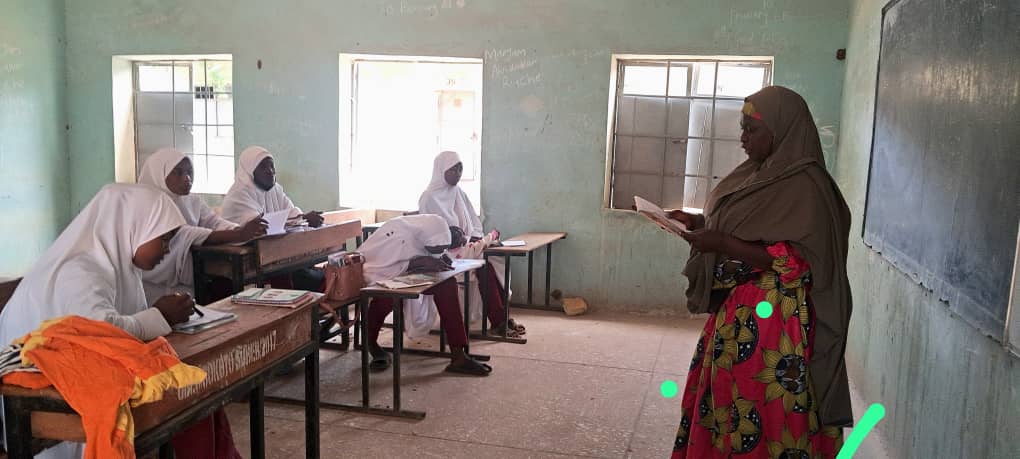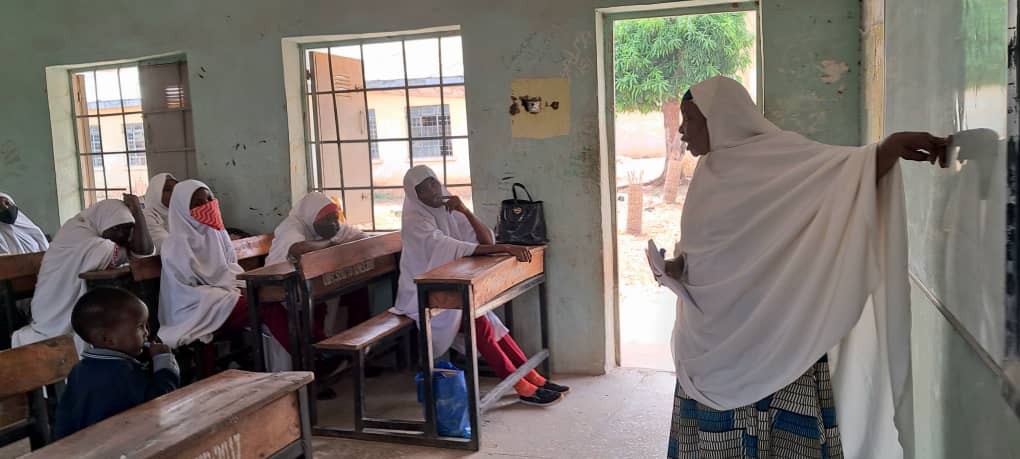By Rakiya A.Muhammad
With a gentle yet commanding presence, Hadiza Malami, 40, glides through the classroom brimming with eager faces and hopeful hearts, her voice resonating with unwavering conviction.
Once left behind by fate’s twists, Hadiza now symbolises an unyielding spirit and fierce determination. She guides her fellow women on a journey, embodying the strength of bravery and the life-changing potential of education. Their resilience is a beacon of hope, inspiring others never to give up.
Her past struggles have forged an unyielding determination to uplift others through the power of education. With a gentle smile and a rich tapestry of life experiences, her instruction transcends the confines of textbooks. She weaves tales of hardship and victory, inspiring all to remember that the pursuit of knowledge and the reclamation of their futures are always within reach.
Nipped Under the Radar
Hadiza is one of the many who lost the opportunity to embrace education during her formative years, constrained by the weight of a society deeply rooted in tradition.
Startling Nigerian education statistics reveal that over 10 million children are out of school, with girls constituting a significant majority, at over 60 per cent.
Data also indicates that the country’s northern region is grappling with complex challenges, dominating the states with the highest percentage of out-of-school children. These challenges include cultural barriers, higher poverty rates, and insecurity, making the education issue in this region particularly intricate.
For many girls in Nigeria, especially in the north, the lack of education leads to a grim reality-a vicious cycle of early marriage, lower literacy rates, and limited economic opportunities. It is a stark reminder of the urgent need for educational reform.
Hadiza reflects on her early days as a young girl, freshly admitted to primary school. Yet, that dream was abruptly interrupted, leaving the image of herself in uniform permanently etched in her memory.
“Despite the cultural obstacles that impede girls’ education in our society, my father wanted me to pursue my education. Sadly, just two weeks after I started school, he passed away,” Hadiza remembers.
“Following my father’s passing, the family resolved to arrange my marriage.”
Hadiza missed the opportunity for education, yet the marriage path proved even more daunting.
“The first marriage fell apart, and then I entered another; yet that too ended in dissolution,” she reveals.
“I had children from both marriages, and following the divorce, the weight of their upbringing fell entirely on my shoulders.”
Turning Back Time
The Sokoto state government launched the Second Chance programme, the Women’s Centre for Continuing Education, in a bold move to offer educational opportunities to women who could not pursue their education in their youth. This comprehensive programme provides formal education, practical skills training, and strong support networks, empowering these women to gain knowledge and thrive.
“It is a cohesive system, supporting individuals in pursuit of a second chance alongside those who have never set foot in a classroom,” asserts Professor Mustapha Namaka, Executive Secretary of the Sokoto State Female Education Board.
“Our initiative, Second Chance, includes four Women Continuing Education Centres thoughtfully positioned across regions of the state, particularly in Tambuwal, Sokoto South, Isa, and Gwadabawa.”
He adds: “These centres serve as a journey for women to develop their skills and talents; we aim to ensure that education is within reach for every woman, regardless of her marital status.”
Namaka underscores the initiative’s profound impact: “The transformative power of these Continuing Education Centres in Sokoto state is unmistakable. The evidence is clear; numerous women who have had a second chance at formal education have not only completed their studies but have done so with remarkable success. Many have even surpassed their academic goals.”

He emphasises that these women transform their societal roles as they seize their educational opportunities, moving beyond the conventional confines of motherhood and wifely duties to adopt new identities as entrepreneurs, leaders, and change agents. “This initiative not only uplifts women but also plays a vital role in the socio-economic growth of the communities.”
Emerging from Shadows
Hadiza is a beneficiary of the second chance initiative.
Amid life’s unpredictability, she discovered the Women’s Centre for Continuing Education.
“I chose to embark on a journey in education, driven by my enduring passion for learning. That was the reason for my sojourn here,” Hadiza adds.
“I began my education at the Second Chance school, progressing from primary to secondary. After graduation, I moved to the State’s College of Education, only to return here as a teacher.”
Nana Asmau Abdullahi, once an out-of-school girl, is another testament to overcoming societal obstacles and embracing education as empowerment. She rose from the constraints of early marriage that threatened to define her future.
Fuelled by steadfast courage and resolve, she embarked on her journey by joining the specialised second-chance school for women facing comparable challenges. Her journey illustrates the strength of perseverance and the life-changing impact of learning. Nana Asmau not only finished her education but truly shone in her pursuits. Today, she steps back into the school that once gave her a second chance, where she is shaping lives in the same way it has transformed hers.
Seizing the Moment
A significant number of the current students share a hopeful outlook on reshaping their narratives.
Zahara Haliru, a 35-year-old student at the second chance school, shares her story: “Before I joined the program, I had never stepped into a school, as my family believed that girls should not pursue an education.”
As a devoted mother and a third-year student, Zahara Haliru experiences immense joy when she reflects on the remarkable strides she has achieved. Her journey serves as a beacon of inspiration for others, showcasing the profound influence of education on individual growth and empowerment. She imbues the audience with a profound sense of hope and inspiration.
“Once upon a time, I found myself grappling with the challenge of crafting even the most basic letters, much less the names of my clients or their measurements as a tailor.” It was hurting my business. “At last, I can write and read,” she reveals.
“With this school, I have realised education’s profound impact on propelling business success; we sincerely thank the Second Chance Initiative for creating a welcoming atmosphere.”
Similarly, fourth-grade student Nafisa Aliyu found herself denied the chance to pursue her education solely due to her gender. She recounts her journey filled with challenges and victories, offering a distinctive viewpoint on the effects of the second-chance initiative. Her story and others enrich the tale, enhancing its relatability and engagement for the audience.
“Once, I faced challenges whenever I attempted to read or write, but now my comprehension has greatly expanded.”
A newcomer to the school, Khadija Almustapha, draws inspiration from the students and her neighbours within the community. Their intertwined journeys and collective encouragement cultivate a warm and uplifting atmosphere for learning, instilling a profound sense of belonging and optimism.
After finishing primary four, I was married off. “Yet, as the days unfolded, a deep desire for further education began to awaken within me,” Khadija reflects.
“The uplifting influence of the school on my neighbours involved in the second chance program motivated me to take a similar path.”
Striking the Balance
Balancing schoolwork and family life presents challenges, yet it ultimately revolves around discovering that ideal equilibrium.

Students sometimes find themselves engulfed by the challenges of juggling their academic endeavours alongside the demands of home life. Yet, they frequently uncover powerful coping strategies through the pursuit of thoughtful advice.
“Acknowledging the many responsibilities that come with family, we continually practise patience and offer our understanding and compassion to the students,” states Juan Ayegbe, a departmental head.
“We offer support and direction, helping them understand the importance of education while managing their studies alongside home duties, and involving them in learning.”
Umul Khair Ibrahim Abass, Principal of the Women Centre for Continuing Education, Sokoto, is elated by the programme: “I am delighted that the Second Chance programme is transforming the lives of our women and creating a new reality, reshaping individuals who have benefited from it into inspiring role models for others.”
Fatima Ali, a passionate advocate for rights, recognises the profound influence of the second chance initiative. She emphasises the importance of overcoming obstacles like insufficient resources and funding, which can hinder the ability to support students effectively and restrict access to enriching activities that enhance the educational journey.
Elevating the Endeavour
Some students have irregular school attendance, which they attribute to financial constraints, such as having to foot transport fare to maintain consistent attendance.
However, the state government intends to enhance the programme to ensure that students fully utilise the scheme and that more women embrace the initiative.
Chika Mutala Abubakar, the component lead for the second-chance education initiative of the Sokoto State AGILE programme, shares the initiative’s comprehensive and strategic approach to improving it.
“We plan to establish 46 second-chance schools across the state, with two in each local government,” he discloses.
“With a clear vision, we will engage with the 23 local governments to pinpoint skills that hold market value, as the focus lies not merely on acquiring skills, but on their marketability.”
He elaborates: “We will introduce incentives, such as conditional cash transfers, to support students in seeking a second chance at education, considering factors that hinder their regular school attendance.”
To qualify for the conditional cash transfer, he explains, “you must be a registered student at that school, attend at least 75% of your classes, and fall within the eligible age range (i.e., not for girls of conventional school age who should be in the regular school system).”
For Hadiza, the uplifting influence of initiative in moulding women’s identities, especially in societies steeped in longstanding customs and traditional roles, is heartening. “The institution has profoundly enriched my skills and bolstered my self-assurance,” she expresses. Because of it, I was able to pursue my education. I guide others in their learning journey while earning a living, nurturing, and caring for my children. This second chance rewrote my story-from Missed Opportunity to Mentor.”


